Learning a language in 200 hours?
German is an impossible language. Right after I got the Zertifikat Deutsch B1, I forgot half of what I’ve learned. This is in part because all the methods and textbooks are stupid–but I’m not going to post again about how none of the so many grammar books I own bother to cover all the queer situation that can be encountered in this language. Clearly, if the French have a fabulous grammar in the Belgian Le bon usage (“le Grevisse”), the Germans didn’t have an Austrian to make them a similar masterpiece.

As for the textbooks, it’s outrageous that a nation of structured minds–engineers and philosophers, not just Bundesliga players!–couldn’t find the people to properly list, define and explain all the complex rules that make this language. Their language. And their teachers fail to understand what’s so difficult in learning their language as an adult, especially when the textbooks sanctioned by Goethe-Institut are so useless: one cannot read them the way I read my school textbooks decades ago, simply because these methods of learning German do not include all the information in the textbooks, some of the information is to be conveyed by the teacher! Yes, even some grammar rules. The last 15-20 years have changed the old style of writing language textbooks–“here are the rules, now let’s make some exercises”–into a new one: “let’s try to infer the rules from the following examples”! What the fucking fuck. Then, instead of adding some more texts and “old-school” exercises, they’re using “word games to be performed with your classmates” and “word games in which the student has to imagine which word goes where so that the phrases make sense”! What was wrong with the old language methods, those that were still in use in the 1980s?
So I needed to refresh my German before any attempt of further improvement. There must be some apps for that, right?
It’s just that most of the well-known apps are pure garbage–at least for a language with such a complex grammar. Exit Duolingo, busuu, Babbel and the like.
As I said I’d need to read more texts, I thought of giving a try to Beelinguapp: an app that can read books to you; not just audiobooks, but bilingual books:
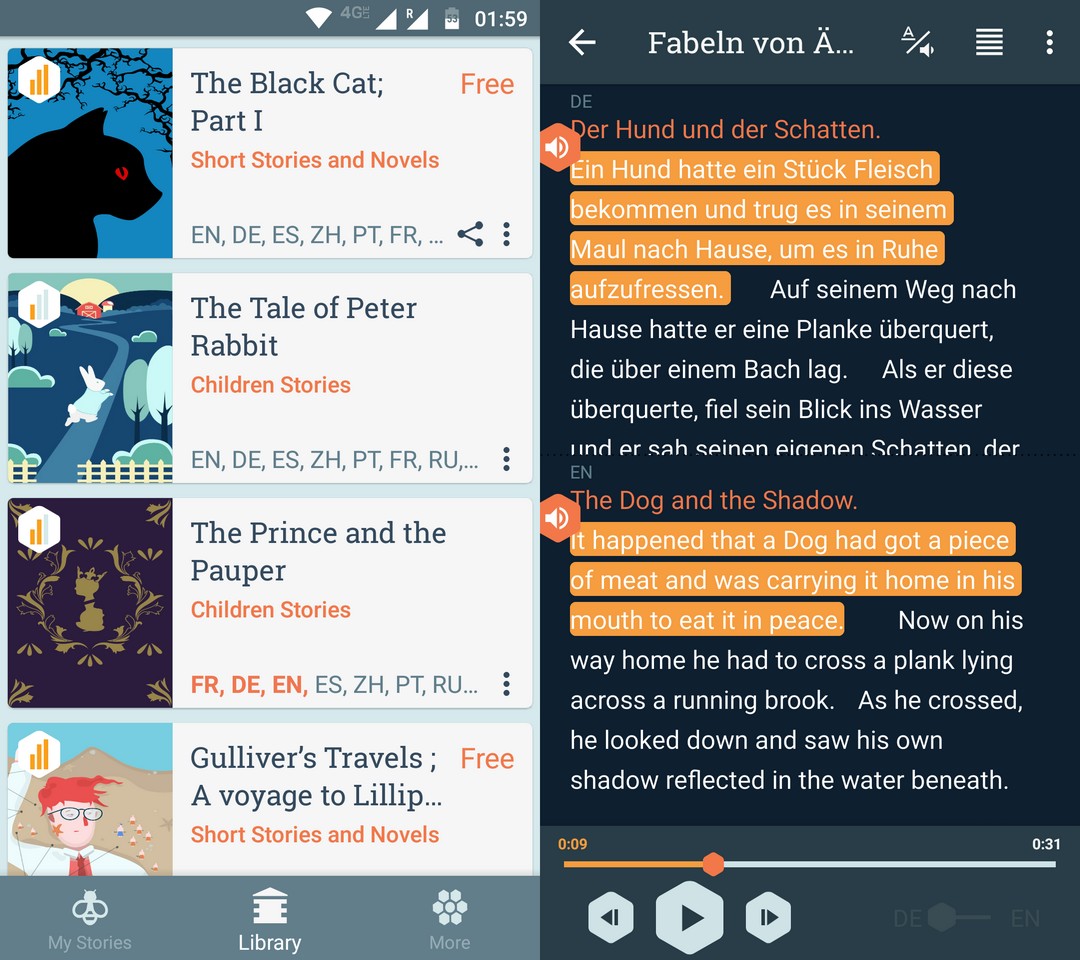
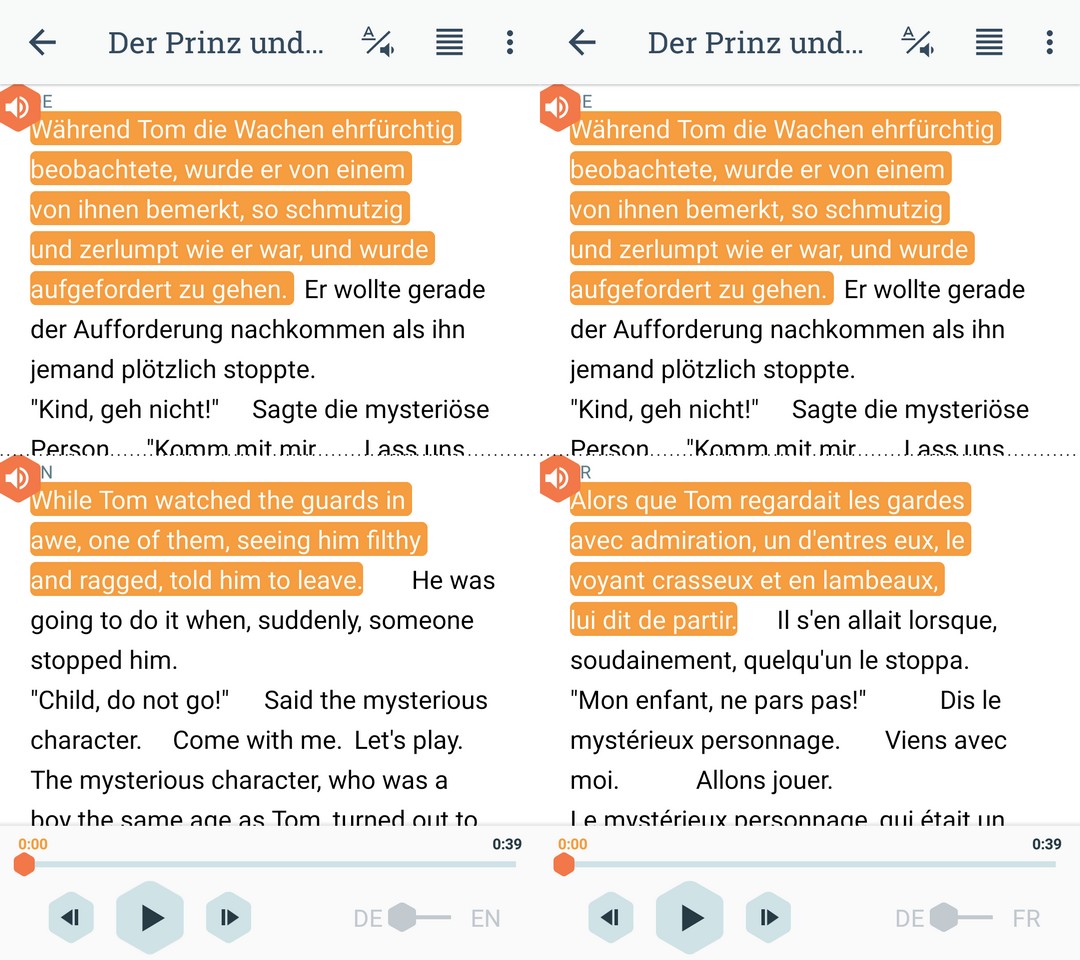

The app is great per se (in spite of some bugs), but I found myself not advanced enough for such literary texts.
How to practice, rehearse and learn more than those bloody A1-A2-B1 language classes taught me without using the infamously idiotic flashcard-based apps?
Apparently, there is an app with Artificial Intelligence added to flashcards: Lingvist. I only found about it the other day, despite its existing since 2014!
TechCrunch, April 1, 2014, Lingvist Raises €1 Million To Reduce The Time It Takes To Learn A New Language:
Founded … by Mait Müntel, Ott Jalakas and Andres Koern, the company’s inception came about after Müntel, who has a background in physics and had been working at CERN for several years, became interested in learning French. As he began researching what online/digital language learning solutions already existed, none of which he found were up to scratch, he reasoned that by subjecting languages to statistical analysis in order to establish frequencies and correlations and by optimising the “memorisation process” it would be possible to drastically reduce the time needed to learn a new language.
Müntel then set about building a prototype — which he himself used to learn French to a high enough level to pass the Estonian State Exam in 200 hours, apparently — and showed the software to early Skype engineer (and since serial investor) Jaan Tallinn who encouraged him to pursue the project as a bona fide startup.
“Inefficiencies in language learning come from learning irrelevant content and suboptimal repetition intervals,” Müntel tells TechCrunch. … “We crunch through immense quantities of text to establish frequencies and correlations that enable us to prioritise what is most important in a language and teach the most relevant and contemporary vocabulary,” he adds. “The order is not [the] same for everyone, but depends on each and every student’s skills and knowledge.”
It’s this “adaptive learning” approach — in which the software tracks what you know and what you don’t, in order to determine what you should learn next to fill in gaps most efficiently — that the company claims sets Lingvist apart from competitors.
Les Echos, August 25, 2016, Le physicien qui révolutionne l’apprentissage des langues:
L’idée en est venue à cet Estonien au moment d’apprendre le français. Pas convaincu par les logiciels alors disponibles sur le marché, ce physicien de formation a commencé à travailler à son propre prototype. Avec une approche qui, selon lui, est nouvelle en la matière : l’analyse des langues pour déterminer, statistiquement, les mots les plus utilisés en fonction des centres d’intérêt des usagers, et le recours à une méthode d’apprentissage tenant compte des capacités de chacun à mémoriser.
“De la sorte, nous pouvons réduire le temps nécessaire pour apprendre une langue”, assure le cofondateur et PDG de Lingvist. “C’est possible en 200 heures”, assure-t-il.
… Depuis, le physicien a quitté le CERN et dirige près de 40 personnes. Parmi elles, dix programmeurs et une quinzaine de linguistes.
Des investisseurs estoniens et nordiques ont été les premiers à mettre 1 million d’euros dans le projet. Puis Lingvist a reçu une subvention européenne de 2,2 millions dans le cadre du programme Horizon 2020 destiné à rendre des PME plus compétitives.
“Nous sommes persuadés que les gens seront prêts à payer pour le gain de temps considérable obtenu grâce à notre logiciel. L’idée est de proposer, à partir de l’an prochain, un abonnement mensuel de 10 à 20 euros par mois”, précise Mait Müntel. En attendant, le logiciel, accessible sur ordinateur et sur portable, est gratuit.
OK, let’s try it while it still seems to be working for free. (Just like the previous app, the average rating on Google Play is 4.7.)
It’s still flashcard-like, but different. For one, it does include a sort of a grammar compendium called “Grammar Tips”; here’s an incomplete list of topics for learning German through English:
Still, this doesn’t mean the app is really going to explain things. The app proper starts with assessing your level, and the flashcards used in the process are identical to those used to move you farther into the language–so I’ll skip them for now. After a while, it stopped asking me things and it decided I know 257 out of 3937 words in German:
Of course I know more than that, but I wasn’t asked for more. It just stopped the assessment! OK, so this means I could read 38% of words of any text. But is it going to only use 3937 different German words?! As the app itself claims, a vocabulary of 5000 words only allows one to understand 84% of words of any text… (Side note: Germans always use the ugly term Wortschatz, as they seem to have forgotten that Lexik can mean the same thing.)
The problem is, I started to have objections even as the app was assessing my level! Their linguists weren’t able to ask unambiguous questions and to accept more than one correct answer.
Here, they ask for place, seat, and they only accept der Platz, despite correct answers also being der Sitz (my choice) and der Sitzplatz:
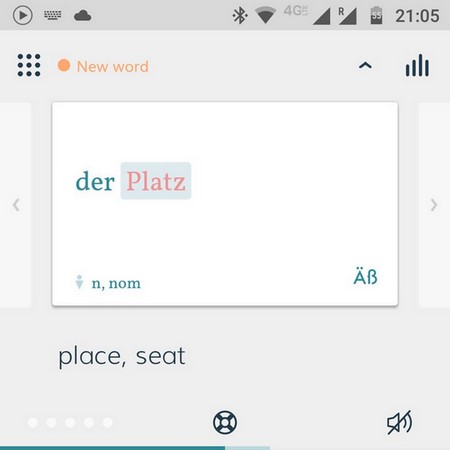
Then, how would I know their community is set to mean Gemeinschaft (my choice) or Gemeinde?!
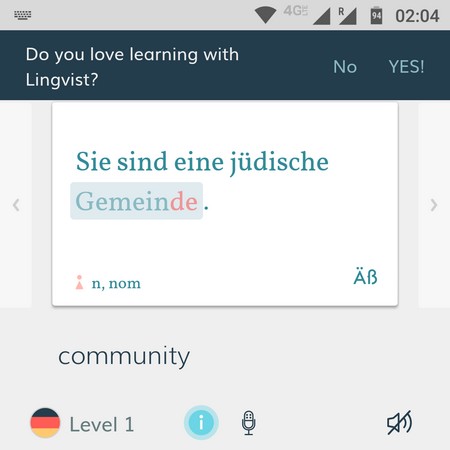
Going to common adverbs now, the English further, continue is not the perfect definition of weiter, so that I was tempted to write “Wir müssen noch arbeiten” (which is not incorrect!):
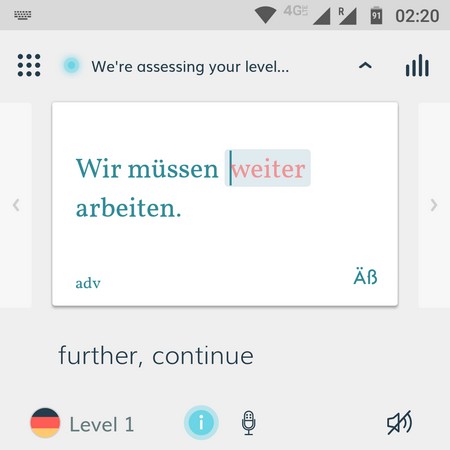
I was tempted to uninstall the app, but I didn’t do it.
Now, tell me what do you mean when you say “the new work” in English: do you mean work as in Arbeit, or work as in Werk? Besides, has anyone heard any German referring to “die neue Arbeit”?
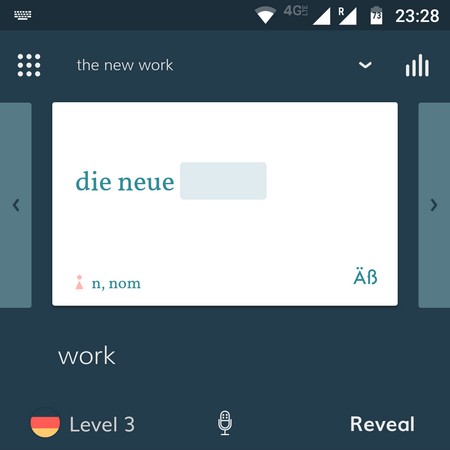
The English adverb even is not the definition of the German pronoun selbst:
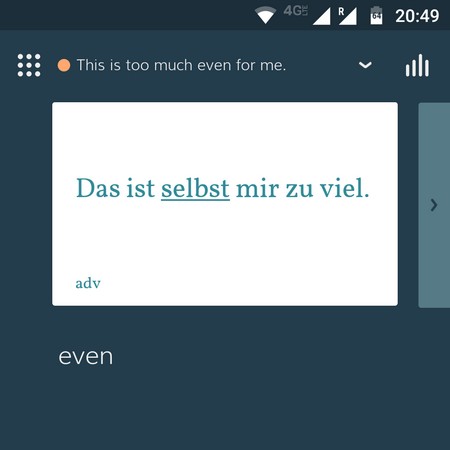
I know, one cannot translate Wort für Wort, but still…
What does one mean when saying in English that “all taxis are in use”? Does one ever say such a thing? When you call a cab company, do they really say this when there’s no free taxi? Moreover, Einsatz isn’t a word I’ve ever encountered otherwise than in “im Einsatz sein” (to be on duty, to be in a mission), but taxis are not police cruisers, nor ambulances, and even less military vehicles:
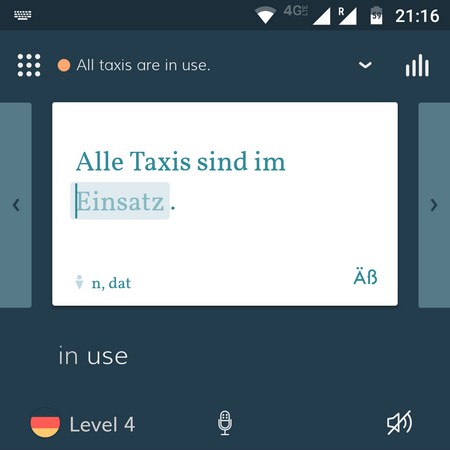
Sometimes, the app doesn’t teach you much when it asks you to translate ticket into Ticket, or category into Kategorie (I was thinking of Klasse, Gruppe):
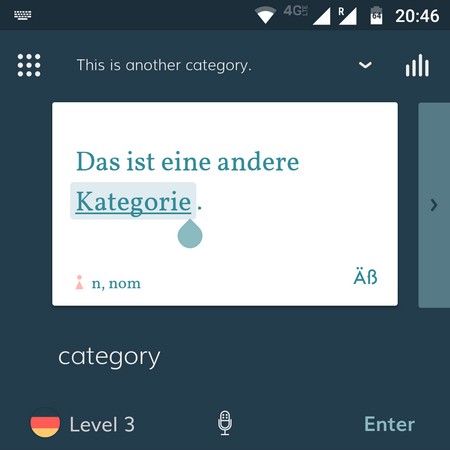
Or persons, people into Personnen, not Leute:
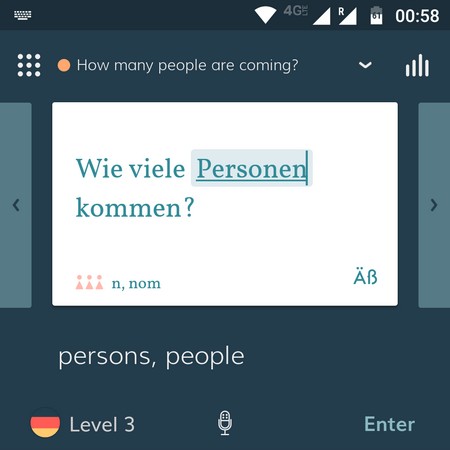
Now, how do you think they described Angaben (details, indications, information, data)? Righto, data, details (to make people think of Daten):
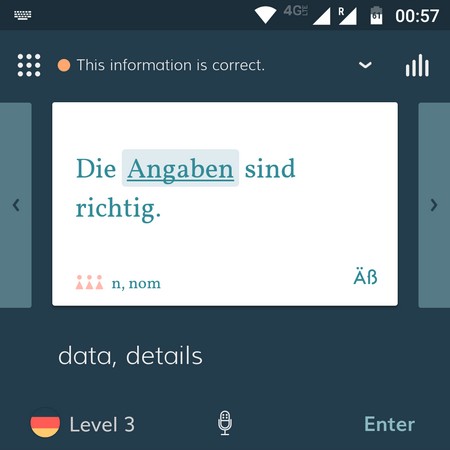
In “René is staying at home,” does the verb stay have the meaning of remain–hence bleiben— or simply to be there–hence stehen (sich befinden)?
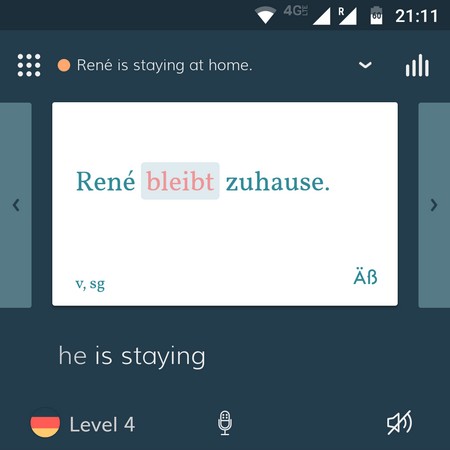
Learning through French would have been easier, as bleiben goes into rester in French (say, “René est resté chez lui“).
Getting to things that nobody ever explained to me when they taught me the very little German I know: does one ever say “I need back to work,” without a verb? Because “I need to get back to work” is told in German without using any of the verbs gehen, zurückgehen, zurückreichen, sich zurückbegeben–it’s simply “Ich muss zurück and die Arbeit,” with only the modal verb and no real verb!
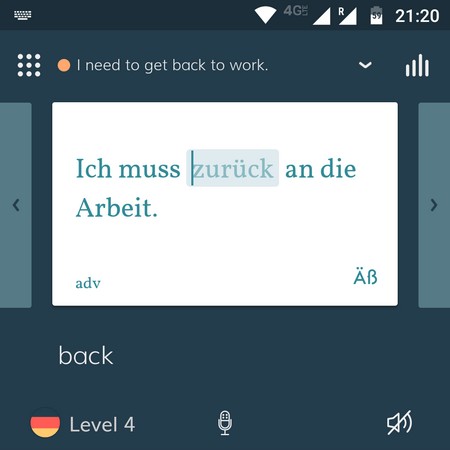
Before I die, I must find out why they literally say in German things like “I must to the supermarket“… I mean… you must WHAT to the supermarket? WHAT IS THE ACTION VERB?! (This is not a language with consistent rules; this is either a joke or a nightmare.)
Ergonomics-wise, I object to the way the cannot display all the information at once, as they often hide a second translation behind the main one. In the first example, tapping on “You are joking me! (usage)” swaps it for “This is probably a joke (literal translation)”…
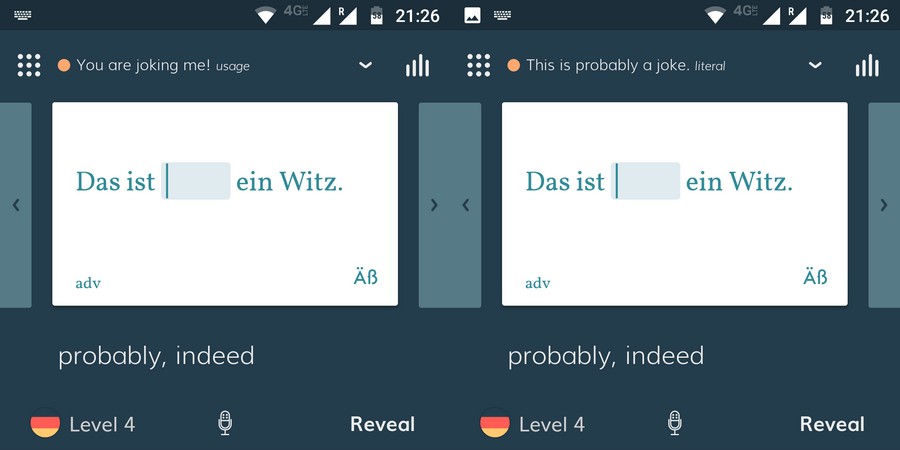
…and here, “Is that why you called? (usage)” is hiding “Did you call because of this? (literal translation)”:
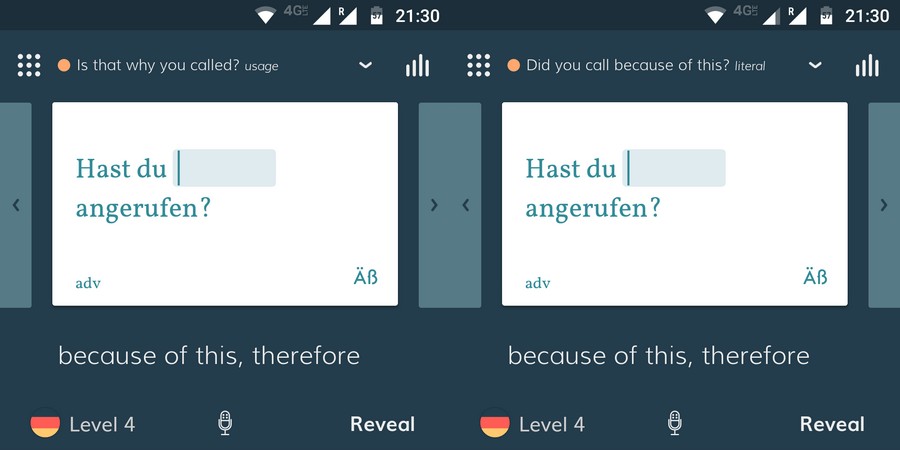
Correct answers: wohl for probably, indeed (a kinky one); deshalb for because of this, therefore (yeah, despite dafür being a cognate of therefore, it doesn’t mean the same thing).
On occasions, the app promises more details in the future, but I fail to imagine how is it going to do that:

Oh, but I forgot! On one occasion, there was an explanation!
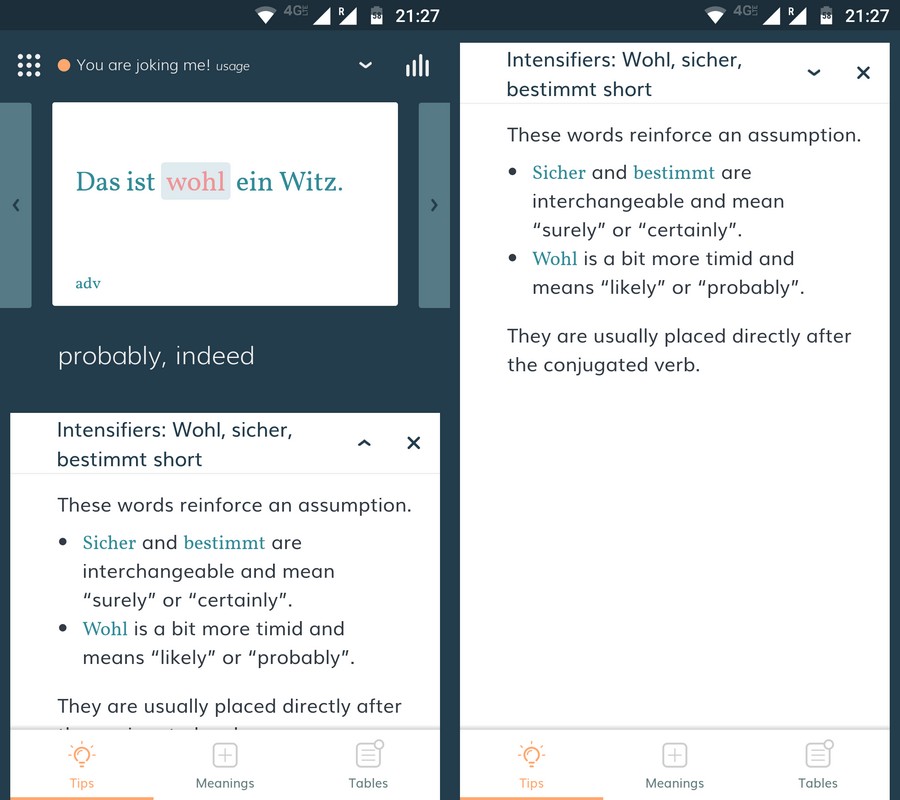
All in all, I’m skeptical that 200 hours would get me anywhere, but I’ll keep fiddling with Lingvist for a while… so I could eventually go* back to Beelinguapp!
__
*the verb go should be removed from the German translation of the phrase
♦
LATE EDIT: I just discovered that Lingvist is not that original, after all. One of the principles used by its designers is the Spaced Repetition System (SRS), which is also used by a number of other apps. One such apps that somehow caught my attention is MosaLingua. Their Android apps are free for the basic levels and 5.49 € apiece for the “complete ones” (9.99 € for Medical English).
Some random reviews of the system and its apps: a quick one in English; a very to the point one in German; a rather detailed one in English (the guy wanted to learn Italian); a very short one in English.
I won’t add very much, except for a few points based on my experience with using it for German:
- There is no grammar whatsoever, except for verb conjugations.
- Even the “full” apps include in-app purchases for the optional packs.
- The navigation in the app is confusing, with too many submenus.
- One has to choose the “learning objective” first: Travel; Speak and socialize; Work and do business; Improve my grades at school or study abroad; Pass an exam (Goethe-Zertifikat, TestDaF…); Other. Based on that, the 9 levels and the dialogues level change a lot, something that I totally dislike.
- Beyond the “Learn” section, there’s the “Explore” section, which seems to be the same for all objectives, and structured on themes (“Categories”), not on levels. One can add flashcards from here to their lessons.
- The flash cards are dumb, and one has to turn them to see the fucking text.
- The paid apps can download high-quality audio pronunciations that should replace the synthetic voice. By my experience, the human voice would however not apply to all the contents of the flashcards.
For instance, in the card below the human voice would read “stechen (sticht, stach, hat gestochen),” whereas “Ich wurde gestern von einem Insekt gestochen” is read by the synthetic voice:
The flashcards from the themed “Categories” are different, and they’ll be read by the human voice:
These are small bugs; what bothers me is that the “method” can’t teach me anything but words and clichés, and not in the best possible way. There’s no real method as such (except for the aforementioned SRS), but a huge mess with an attempt of a structure based on “objectives,” with added phrasebook-type contents (which is more practical, by the way).
Oh, and the company behind MosaLingua is MosaCrea Limited, apparently based in Lyon (but then why “Limited” instead of “S.A.R.L.”?), with a secondary office in Barcelona. Nothing about this company could be find on their websites, which is a shame. Only on Google Play one can find some relevant data: MosaCrea Ltd, La Cordée, 61 cours de la Liberté, 69003 Lyon; their page for Mention légales only gives the RCS (Registre du Commerce et des Sociétés) number and the European VAT number for… their hosting, GANDI SAS! It’s unacceptable to keep this low profile as a company. What are they trying to hide? Are they a real company? You know, La Cordée is nothing but a coworking space!


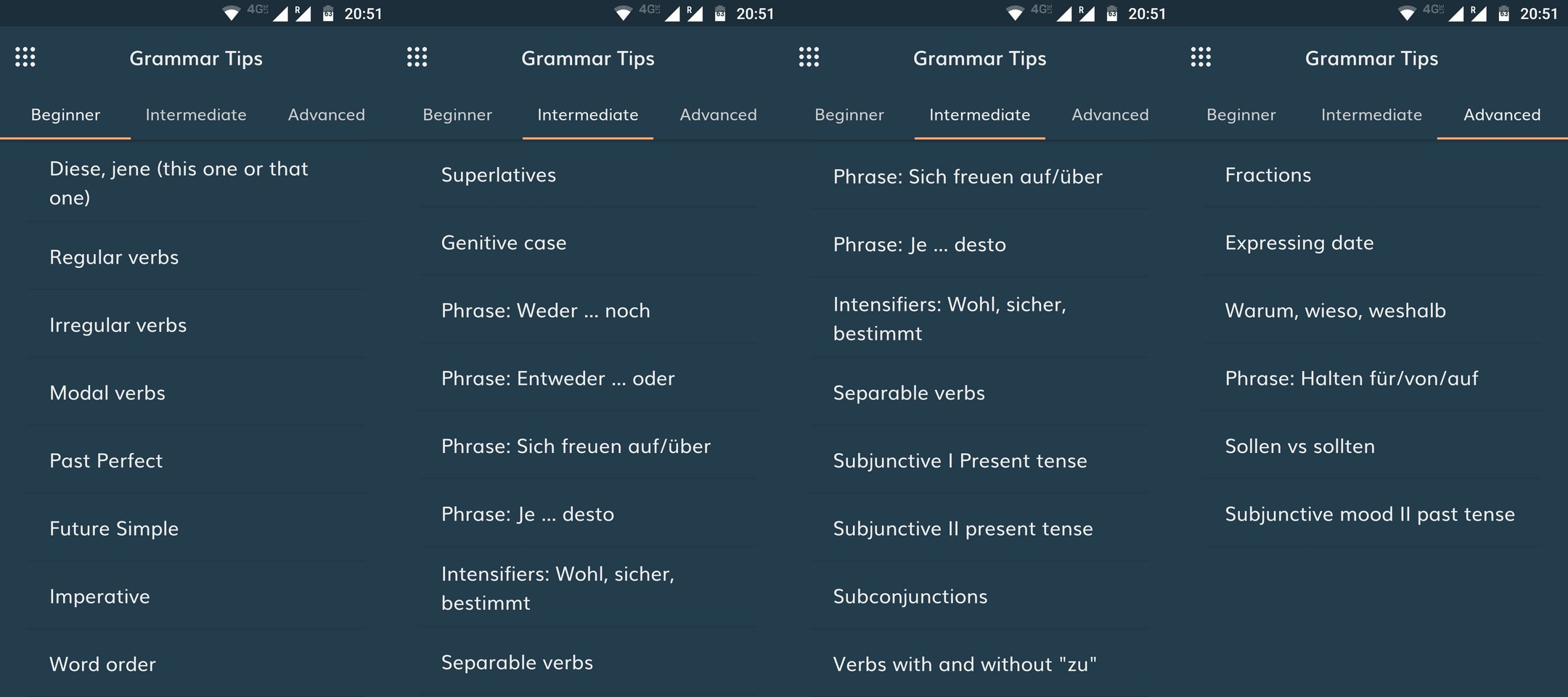
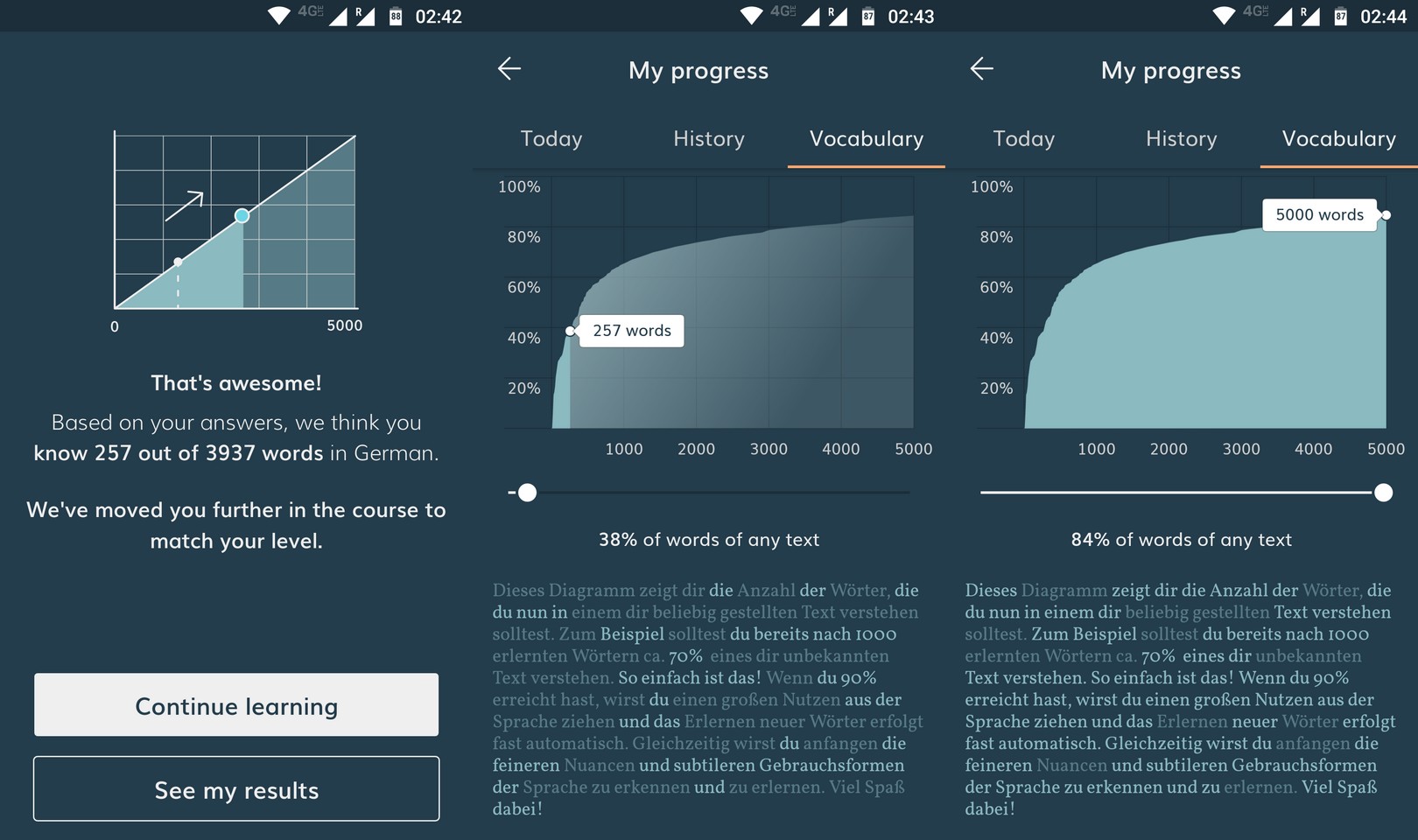
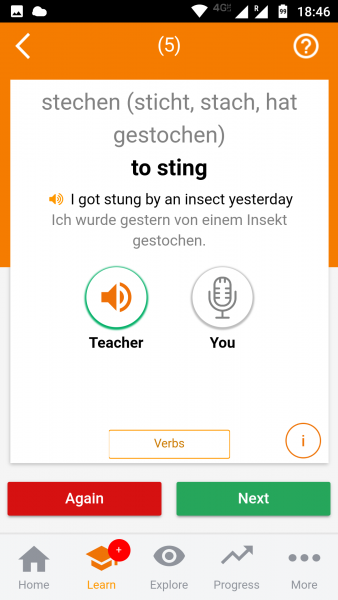

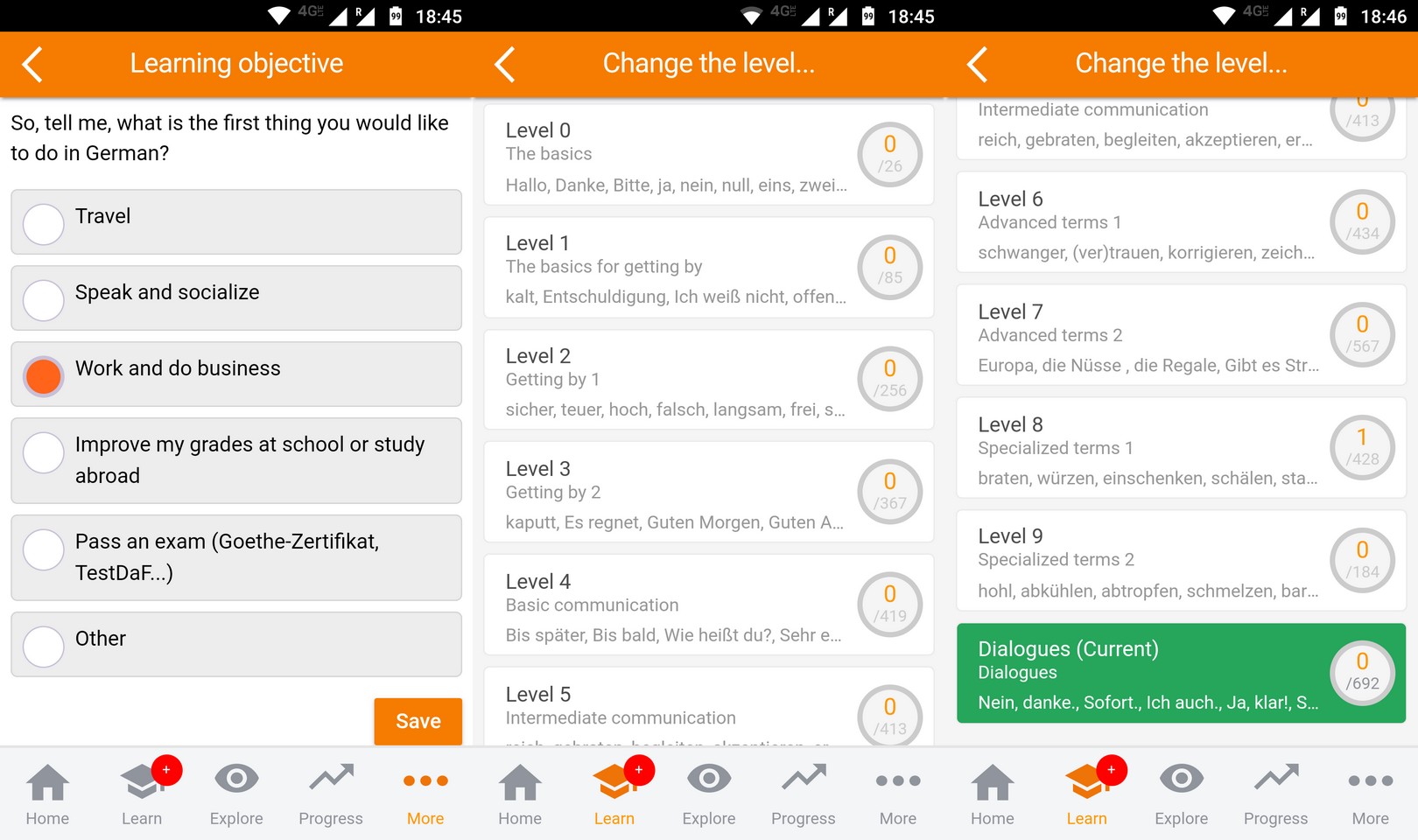

As it’s almost always the case with reddittards, those commenting here really don’t have a clue of what I was criticizing.
Added some comments on MosaLingua.
> Even the “full” apps include in-app purchases for the optional packs.
Not good, this…
Hey,
many thanks for linking to our review, I appreciate. And thanks² for pointing me to Beelinguapp. I will definetly give this one a try 🙂
Greetz
cR
Language apps seem to suck, suggests an article.
How to Almost Learn Italian
«Language apps like Duolingo are addictive—but not particularly effective.
…
You’re at the airport outside Rome, she said, and you want to get downtown; how would you ask? I gaped like a fish. Words and phrases swam through my mind, but they didn’t add up to anything useful. Laurie switched to a restaurant scenario: “Do you have a table for four?” “I’d like two glasses of red wine.” I knew I had seen all the pieces in Duolingo’s sentences. But I was utterly unable to recall them and pull them together.
Panicking, I fired up Duolingo and almost instantly saw the problem. The app had made me a master of multiple-choice Italian. Given a bunch of words to choose from, I could correctly assemble impressive communiqués. But without a prompt, I was as speechless in even the most basic situations as any boorish American tourist.»
I forgot to mention the WordBit series of apps, using the “learn on the smartphone’s lockscreen” method. It’s flashcard-based, but using much better flashcards than other methods (always with phrases to illustrate the learned term): WordBit apps on Google Play.
WordBit German: for English speakers, for French speakers, for Romanian speakers, for Spanish speakers, for Portuguese speakers; WordBit English: for German speakers, for French speakers, for Romanian speakers, for Italian speakers, for Portuguese speakers; WordBit Spanish: for English speakers; for German speakers.
With all their faults, they’re excellent apps.
500 Days of Duolingo: What You Can (and Can’t) Learn From a Language App
https://www.nytimes.com/2019/05/04/smarter-living/500-days-of-duolingo-what-you-can-and-cant-learn-from-a-language-app.html
You can’t learn anything.
Continued in 2021.